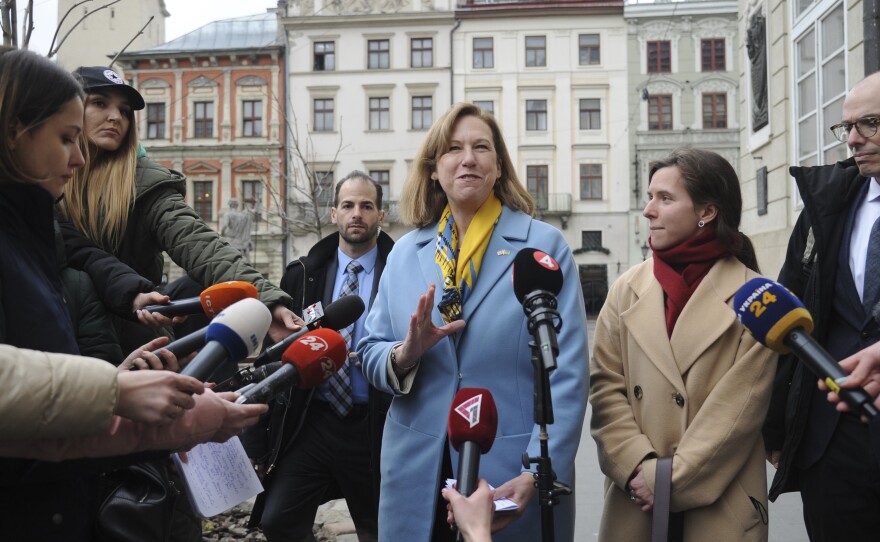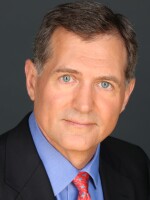American James Berk is an optician from Montclair, N.J. He's now living in Ukraine's capital Kyiv with his Ukrainian wife Anna and their newborn daughter Sophie.
"My job right now is I'm raising raising our daughter. She's under four weeks old and she is, you know, doing what newborns do," said Berk, as his daughter fussed in the background.
So it's a bit hectic in their apartment. And, by the way, the Russians could invade any day.
The family got some good news this week when their daughter received her U.S. passport, allowing her to travel. But Anna has a Ukrainian passport, and doesn't have a visa to go to the U.S.
"Even if we wanted to leave and go to the States, we couldn't do that because she has to get a visa, and with the embassy closed down. That's not an option for us, unfortunately," said Berk.
The U.S. has temporarily shut the embassy in Kyiv and is running a scaled-down operation in Lviv, a city 300 miles to the west. The embassy has urged all Americans in Ukraine to leave immediately.
Berk has rented a car in case the family needs to make a quick dash for the border. But for now, they're staying put.
"It's a difficult decision for us," said Berk. "It's one we're constantly reevaluating. We packed our bags so we can leave if they cut the power and we have to hit the road very quickly."
Some Americans plan to stay even if war breaks out
U.S. officials estimate 20,000 to 30,000 Americans were living in Ukraine, though the numbers are going down as U.S. citizens pull out.
Those remaining include Katherine Quinn-Judge, who's spent the past several years analyzing Ukraine's security situation for think tanks. She keeps close watch on the existing conflict in eastern Ukraine.
"For the last four years or so I've been kind of living and breathing this war," she said. "I would feel really horrible if I left, if I watch the city I've been living in being shelled and had to think about my neighbors and everything. I would much rather stay and just see what happens."
Kyiv residents are growing more concerned, she says, but are still living their lives.
"Kyiv is this really fun sort of mercantile, vibrant, colorful city where people are going to bars, getting in traffic jams, getting in arguments with drunk people in the street," she said. "It's not a place where people are stoically stockpiling food and water."
She estimates half the Americans she knows have left. While she expects to stay, she has an exit plan just in case.
"I bought a train ticket. I've made sure that I have all the documentation that I need for my three cats. And I bought a new cat backpack to make traveling with them easier," said Quinn-Judge.
Some who left Ukraine hope they can return soon
John Vsetecka is among those Americans who recently left Ukraine — with reluctance.
He's a Fulbright scholar who was working on his doctorate in history in Ukraine when the Fulbright program told him he had three days to leave.
"It was all quite overwhelming, packing up your life and your research and trying to figure out if you're ever going to come back to Ukraine in the near future," he said. "The adrenaline kicked in and I don't think I slept for three days."
The transition hasn't been easy. He flew to Warsaw, Poland, and found an AirBnB — but no longer has access to the archives and Ukrainian historians he was working with.
He said some of his fellow scholars are preparing for new roles.
"A lot of us have transitioned from being scholars to now activists," he said. "If Russia does come into Ukraine, I think a lot of us are willing to help them in any way that we can."
For now, all they can do is wait.
Greg Myre is an NPR national security correspondent. Follow him @gregmyre1.
Copyright 2023 NPR. To see more, visit https://www.npr.org. 9(MDAzMjM2NDYzMDEyMzc1Njk5NjAxNzY3OQ001))







